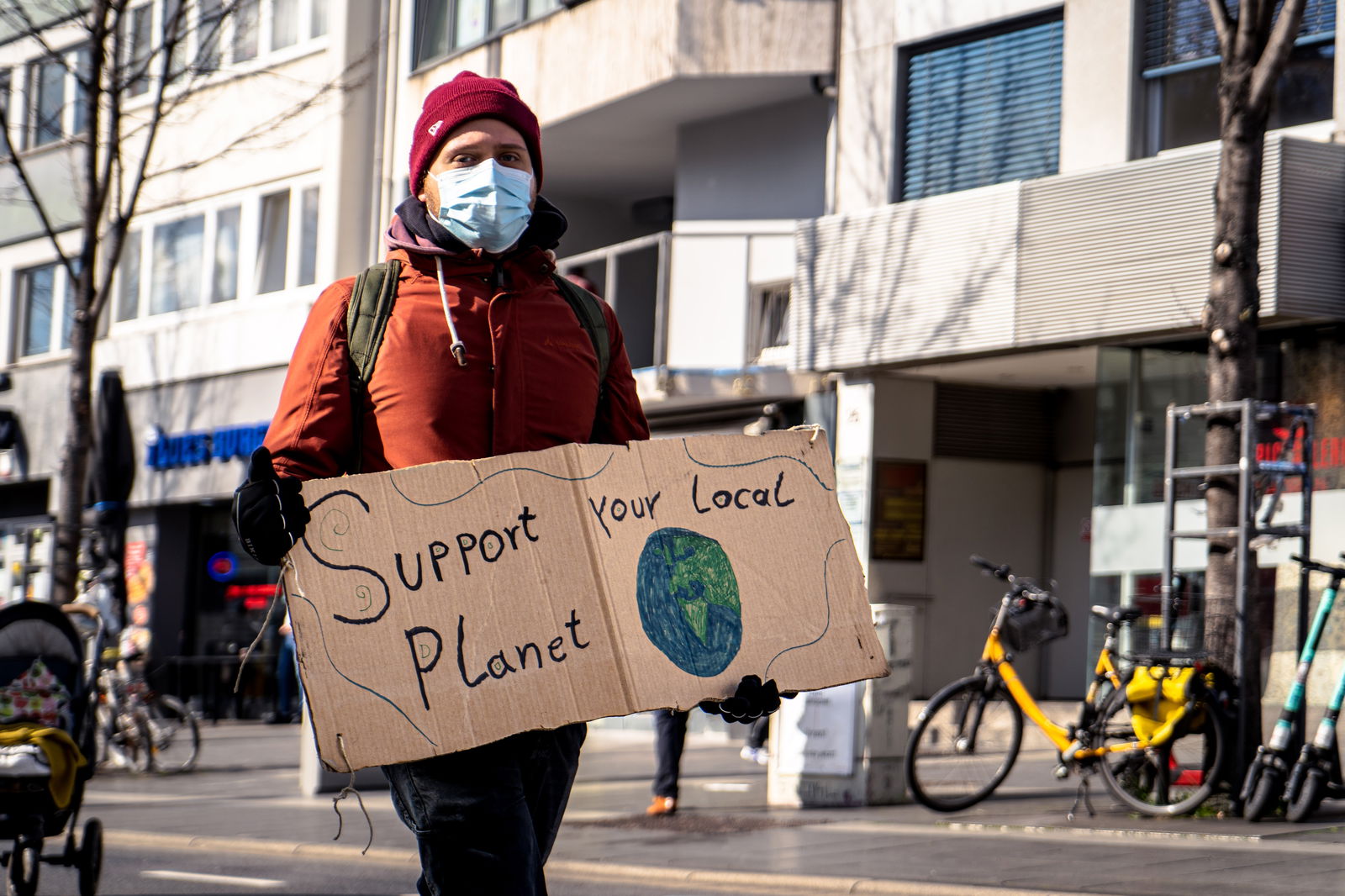Democracy and systemic change: why we have more power than we think


· 8 min read
Not many years ago, the mainstream sustainability conversation was focused on individual actions. 'Swap your plastic toothbrush for a bamboo one!' and 'Stop using plastic straws!' were some of the most popular slogans we would hear.

Image source: Nacho Fernández
These days, however, we don't hear them as often. Does that mean we should continue to use plastic toothbrushes and straws? Not really, but stay with me.
Although individual actions are important and needed, the scientific community is telling us that they are just not enough to revert the damage we have done fast enough to avoid catastrophic outcomes.
The Sixth Assessment Report of the Intergovernmental Panel on Climate Change (IPCC) calls for urgent and drastic actions to limit global warming to 1.5°C.
If individual actions are not the silver bullet, then, what is? According to the experts, what we really need is systemic change.
This particular type of change is deemed to be the most powerful one because it's sustainable and long-term. Systemic change aims to solve issues at their root with a holistic approach to understanding how different elements in a system interact with each other.
It looks at all the interlinked components of a system and analyses how a particular change in one can affect the others. This is especially relevant when it comes to sustainability.
Without understanding issues from a systems point of view, we take the risk of implementing solutions that can backfire, create additional problems, or be even worse than the original issue.
"But how do we achieve systemic change?"
In my view, there are two main types of systemic change: policy changes and behavioural changes. Or, in other words, we can create systemic change through our ballots and our wallets.
Think about this: how much of a positive impact do you make if you swap your plastic toothbrush for a bamboo one, and then go on to vote for a political party that has approved subsidies for plastic toothbrush companies to produce 100 million plastic toothbrushes a year?
Nobody likes to talk about politics. Historically, politics have divided people. But it doesn't have to be like that. There is no perfect political party out there. Most of them have manifestos with good and not-so-good policies. We can learn to be open about them, discuss them constructively and help shape a better future of politics.
The first step towards systemic change is then straightforward: go to the polling station and vote. There is an alarming proportion of the population that doesn't vote, particularly young people. We've lost faith in our politicians.

Image source: Arnaud Jaegers
Whether we like it or not, we live in a political system, and politicians shape our future through policies. Even though there is no perfect party, voting for the one that we believe can create the greater good for people and the planet is an impactful action.
By not voting, we just give more chances of winning to those politicians who don't care. Let's show them that we care by using our ballot.
There is, however, a hidden power of democracy. We've gone to the polling station and voted, so that's a democracy, right?
Well, not quite. Voting is just the initial step. It's our action to elect those who can do the most good. And it's just where democracy starts. From there, the secret weapon of democracy begins: we need to hold our politicians accountable to their promises and demand the changes we want.
That's what creates real, systemic change. Because a big part of systemic change is actually political change through policies. Whether our preferred party is in government or not, we can (and must) exercise our power to ask the people in government to create the right policies.
And there are many ways we can do that. From sending letters and calling our political representatives to calling them out on social media, signing petitions and going to meetings with them.
There is one strategy above all with the greatest chances and power to create lasting political and systemic change: peaceful civil disobedience, otherwise referred to as non-violent direct action. You may be tempted to stop reading here, but stay with me because there is science behind this.
Erica Chenoweth, a political scientist at Harvard, did a comprehensive study in 2013. She looked at 323 violent and non-violent protests between 1900 and 2006.
Her conclusion was that non-violent protests were one of the most effective ways to shape policies. She also found a sweet spot or tipping point — if 3.5% of the population is mobilised, the government has no option but to implement the demands of the population.
One example was Georgia's Rose Revolution in 2003 when more than 180,000 protesters gathered outside the parliament to oust the president. Protesters gave roses to the soldiers and the president was removed without violence.
There are many more examples, like the People Power Movement in Manila in 1986, the renunciation of the presidents of Sudan and Algeria in 2019, and the Suffragettes movement in the UK in 1918, to mention a few.
This shows how we, as a collective society, have much more power than we think. It's not about voting and letting our political leaders do what they please for 4 or 5 years. It's about voting and then engaging in society and politics to shape better policies. Global crises and emergencies, such as the climate crisis, call for civil disobedience to create the much-needed fast and radical changes to policies.

Image source: Mika Baumeister
When you want to create systemic change, collaboration is key. It's a numbers game. If we can get 3.5% of the population to mobilise, the government won't be able to ignore us. My recommendation, therefore, is to avoid creating new groups and joining those already set up to maximise positive impact. Groups like Extinction Rebellion, Greenpeace and Friends of the Earth are creating systemic change, and they are also collaborating amongst themselves, so I would recommend checking them out.
Changing the world and tackling the climate crisis can sound daunting when you are all on your own. When you join millions of other people, however, it suddenly becomes easier (and also more enjoyable).
So should we all stop swapping our plastic toothbrushes for bamboo ones? Of course not.
If you have to choose between swapping toothbrushes or going to a peaceful climate protest — go for the protest, as you are maximising long-term impact.
But one is not exclusive to the other. In fact, there are small chances that you wake up one day and decide to go to a climate protest if you haven't taken any other small personal action before (like the bamboo toothbrush or the reusable water bottle swaps).
We cannot underestimate the power of small actions when done consistently over time. The compound effect makes them really impactful in the long term as well.
And it's mostly because of the mindset you develop when doing small daily actions and changes to your habits. It may seem like getting a reusable water bottle or a reusable bag are trivial actions. They do help but they are not huge in terms of global impact. What is huge, however, is the mindset you are developing when you make those changes and take small actions.
Those habits compound over time. They shape your values and behaviours. They influence your purchasing decisions, which ultimately influence supply and demand in the markets, putting pressure on companies to do better. After months and years, you will realise how much you have changed your lifestyle just because you started with a small action and it compounded thanks to your mindset shift.
For most people, developing that new mindset takes time, so don't put too much pressure on yourself. Do what you can today, and you will do more tomorrow. There's no action that's too small. Just take that first step, and watch the good ripple effect unfold over time.
In summary, I encourage you to develop a mindset that will change the world, by taking small daily actions and keeping in mind that we can influence systemic change effectively through peaceful civil disobedience.
Let's show our world leaders that we care. Let's all become leaders of positive change and show them that we are the ones with real power. All it takes is coming together and collaborating globally as we've never done it before.
Our time is now.
illuminem Voices is a democratic space presenting the thoughts and opinions of leading Sustainability & Energy writers, their opinions do not necessarily represent those of illuminem.
illuminem briefings

Sustainable Lifestyle · Social Responsibility
illuminem briefings

Social Responsibility · Sustainable Lifestyle
illuminem briefings

Biodiversity · Sustainable Lifestyle
BBC

Biodiversity · Climate Change
The Irish News

Diversity & Inclusion · Entertainment
rfi

Climate Change · Art